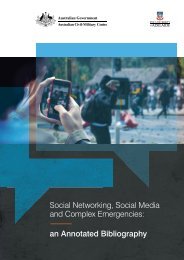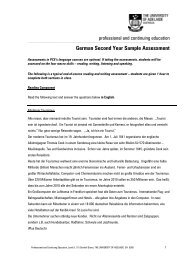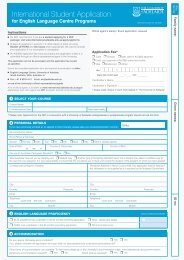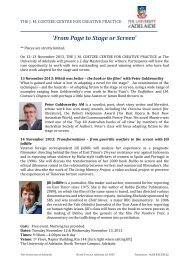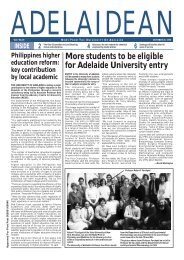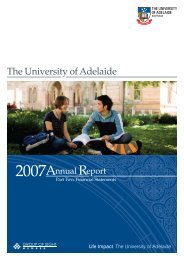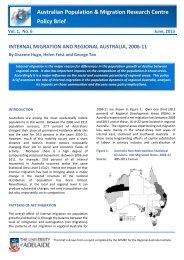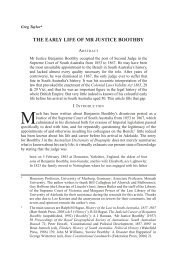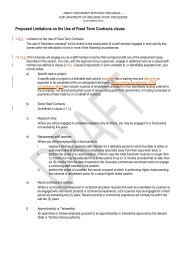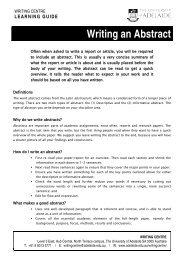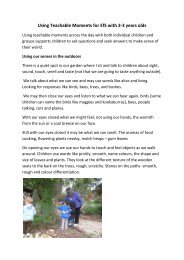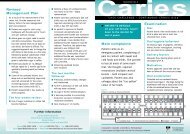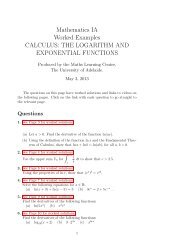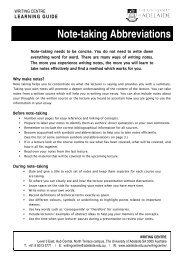Unbridling the Tongues of Women - The University of Adelaide
Unbridling the Tongues of Women - The University of Adelaide
Unbridling the Tongues of Women - The University of Adelaide
Create successful ePaper yourself
Turn your PDF publications into a flip-book with our unique Google optimized e-Paper software.
<strong>Unbridling</strong> <strong>the</strong> tongues <strong>of</strong> women<br />
from her imagination in her early years, as we, who knew her only when world affairs<br />
had claimed her for <strong>the</strong>ir own, had supposed’. <strong>The</strong> diary suggested that someone had<br />
enlisted her affection, only to disappoint her by ‘his worthlessness’. In her second<br />
novel (Tender and True), she depicts <strong>the</strong> heroine <strong>of</strong> <strong>the</strong> sub-plot (Rose Lancaster)<br />
undergoing just such an experience: Rosa discovers that <strong>the</strong> sub-plot’s Byronic hero<br />
(Miles Davanent), to whom she has given her heart, has a wife and a child, both <strong>of</strong><br />
whom he disposes <strong>of</strong> in a thoroughly unfeeling fashion. <strong>The</strong> <strong>the</strong>me recurs in various<br />
forms, in later novels as well, though without <strong>the</strong> moral judgement conveyed in<br />
Tender and True. Perhaps Jeanne Young was right. Perhaps Spence’s autobiographical<br />
comment was made from <strong>the</strong> pain-absorbing distance <strong>of</strong> an old age fulfilled in o<strong>the</strong>r<br />
ways. Disappointment may have prompted a later diary entry in which Spence wrote,<br />
‘ “C … and A … contend that if I do really not wish for marriage, I should talk much<br />
less about it, for my talking gives to people an entirely wrong impression” ’. She went<br />
on to admonish herself: ‘ “Let your ideas never dare to fancy what may happen in case<br />
<strong>of</strong> marriage; that is <strong>the</strong> forbidden subject. Place <strong>the</strong> garrett steadily before you and<br />
endeavour to train your mind so as to be a useful and amiable member <strong>of</strong> society and<br />
no one’s wife, and no one’s mo<strong>the</strong>r” ’. 77<br />
However, <strong>the</strong> portrayal <strong>of</strong> <strong>the</strong> ‘love disappointment’ in Tender and True carries<br />
very little conviction. Indeed, it sails so close to parody that it suggests strongly that<br />
Spence was employing a favourite device <strong>of</strong> romantic novelists with very little imaginative<br />
sympathy. Perhaps, <strong>the</strong>n, her diary expressed a positive decision at least as<br />
much as a hard-won renunciation <strong>of</strong> a dream. In an age when, as she has Margaret<br />
Elliot tell Clara Morison in her first novel, spinsters were objects <strong>of</strong> mockery and condescension,<br />
it was a formidable resolution. In that novel, <strong>the</strong> same two characters discuss<br />
vocation. Clara’s is, Margaret tells her, marriage. Margaret is unsure <strong>of</strong> what her<br />
own is, but she knows it is not marriage: her unwillingness to suppress her own opinions,<br />
to defer to any man simply because he is a man, her range <strong>of</strong> interests and her<br />
independence, make her, she recognises, an unsuitable partner for any man in search<br />
<strong>of</strong> a wife. 78 Spence was, during her early years in South Australia, bitterly resentful<br />
<strong>of</strong> <strong>the</strong> injustice <strong>of</strong> ‘a world made comfortable for <strong>the</strong> exclusive development <strong>of</strong> men’.<br />
Before yielding to a belief in <strong>the</strong> inferiority <strong>of</strong> women, she told her diary, she would<br />
discipline her mind, ‘ “to manly virtues, to manly strength, and to manly studies,<br />
that I may learn to live without leaning on anyone” ’. 79 This was a clear decision – to<br />
face <strong>the</strong> whole world, not merely part <strong>of</strong> it, and to face it directly, without any <strong>of</strong> <strong>the</strong><br />
constraints, <strong>the</strong> mediations, or <strong>the</strong> protections to be gained from having a husband.<br />
38



